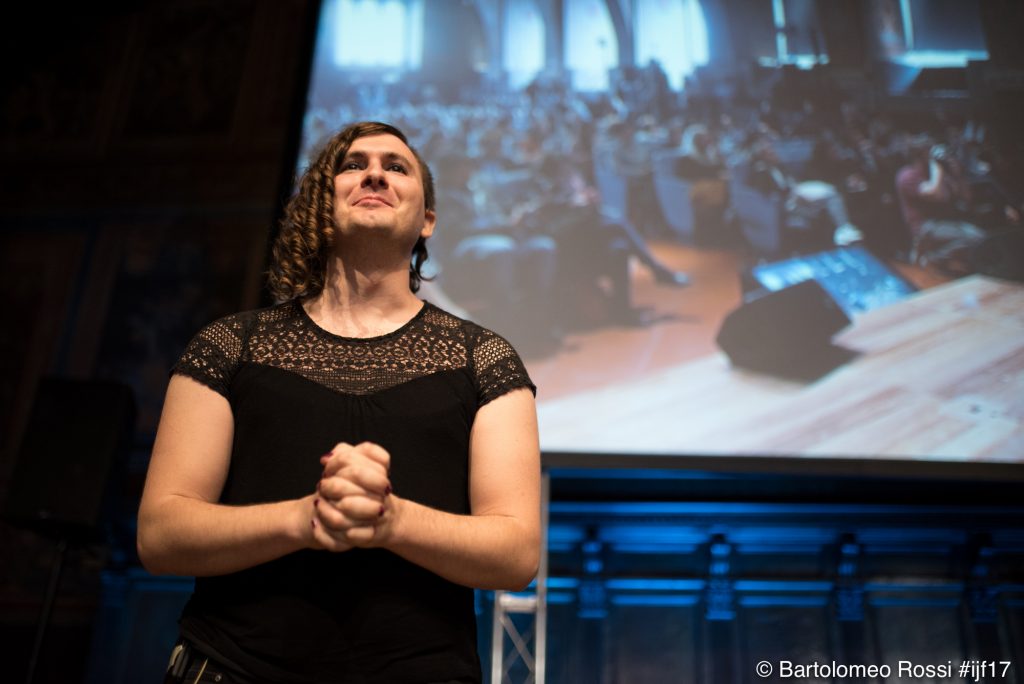
On May 17, Chelsea Manning will see freedom again. A former United States army soldier turned whistleblower, Manning was jailed under allegations that included espionage, after providing WikiLeaks with access to some classified documents in 2010. After spending 3 years in pre-trial detention, in 2013 Manning was sentenced to 35 years in jail.
During his last several weeks in the office, President Obama commuted Manning’s sentence. This was a result of a long-time coordinated attempt by activists, journalists and lawyers to free the whistleblower. Evan Greer, campaign director of Fight for the Future and Manning’s friend, has been one of the loudest voices in this fight. Her presentation “How we saved Chelsea Manning’s life: when activists, lawyers and journalists mobilize together online,” offered the audience at the International Journalism Festival a very personal perspective on the fight. Philip Di Salvo, a researcher and journalist, moderated the talk.
“I did not save Chelsea Manning’s life, Chelsea Manning saved her own life,” Greer said, referring to Manning’s own role in mobilizing the network of attorneys, lawyers, activists and journalists. “Chelsea is one of the most amazing strategists that I have ever met and it is important to understand that she is only getting out of prison because of her ability to connect people,” Greer said.
According to Greer, one of the things that made the campaign for Manning’s release successful was the overwhelming support it got from officials across the political spectrum – from libertarians to conservatives. “It strengthened our ability to get her out,” said Greer.
A transgender woman, Manning was systematically denied adequate health care and subjected to mistreatment. She spent 7 months in extreme solitary confinement – conditions that the United Nations considers as torture. She attempted to take her life twice because of the constant intimidation and harassment at the hands of prison authorities, who were consistently keeping Manning in fear of additional solitary confinement. But every time the authorities harassed or threatened her, the grassroots movement responded – they organised, protested, signed petitions, bringing more and more attention to Manning’s case.
Greer said that Manning was very glad to stay alive after a suicide attempt – she knew how much people supported and loved her. Greer noted that despite the extreme conditions in jail, Manning was always thinking about other people more than herself. Greer recalled her saying, “I want you to talk about other prisoners, my situation is bad, but other transgender people in prison have it worst. Talk about them.”
Because Manning could not communicate with the public, activists came up with a variety of creative ideas on how to make her visible as the government was trying to keep her out of public view. To make that happen, activists created podcasts where things that Manning had written were voiced by an actress. One artist created a statue of Manning using her DNA.
Many famous people reached out to the movement to express their support for Manning. A campaign called “Hugs for Chelsea” was particularly successful, as thousands of people sent their photos to express their solidarity with her. “The idea of being able to give Chelsea a hug on May 17 is what kept me going all this time,” Greer added.
“As a generation, as journalists and activists, we have a responsibility to preserve the memory of this story and to fight in order not to let it happen again to any whistleblower, truth teller or anybody else,” said Di Salvo.
At the end of presentation, Greer echoed Di Salvo’s call to journalists and activists. In her message to the audience, she emphasized the role of journalists in protecting whistleblowers. Greer said that journalists and activists should do everything to make sure that what happened to Manning won’t happen to anyone else.